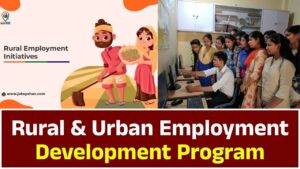Plan:Rural & Urban Employment Development Program
1. Objective
The primary goal of this plan is to generate sustainable employment opportunities across rural and urban areas, especially for:
- Youth and women
- Skilled and semi-skilled workers
- Marginalized communities
The plan focuses on entrepreneurship, skill development, and industry promotion to create both direct and indirect jobs.

2. Key Components of the Plan
A. Skill Development & Training Programs
- Establish Vocational Training Centers (VTCs) in every district to provide training in:
- Digital skills (coding, app development, digital marketing)
- Traditional trades (carpentry, tailoring, handicrafts)
- Modern sectors (renewable energy, agro-processing, healthcare)
- Partner with private companies and NGOs for practical training and internships.
- Include soft skills and entrepreneurship training for holistic development.
Impact: Skilled youth can get employed in industries or start their own businesses.
B. Promotion of Micro, Small, and Medium Enterprises (MSMEs)
- Provide financial support and incentives for MSMEs:
- Low-interest loans
- Startup grants
- Tax benefits for the first 3–5 years
- Support women entrepreneurs and youth startups via mentorship programs.
- Encourage local manufacturing and cottage industries to boost rural employment.
Impact: MSMEs are labor-intensive and can generate thousands of jobs locally.
C. Rural Employment Generation
- Expand programs like Mahatma Gandhi National Rural Employment Guarantee Act (MGNREGA) to provide wage employment in rural infrastructure and development projects.
- Encourage agriculture-based entrepreneurship, including:
- Organic farming
- Food processing units
- Dairy, poultry, and fisheries
- Train rural youth in modern agricultural techniques for higher productivity.
Impact: Reduces rural unemployment and discourages urban migration.
D. Urban Job Opportunities
- Focus on IT, services, and tourism sectors in cities:
- Encourage tech parks and startup incubators.
- Develop tourism and hospitality hubs, generating jobs in hotels, guides, transport, and handicraft markets.
- Promote Gig Economy platforms and remote working opportunities.
Impact: Engages urban youth and skilled professionals in employment opportunities aligned with modern economic trends.
E. Public-Private Partnerships (PPP)
- Collaborate with industries, educational institutions, and NGOs to implement skill training and job placement programs.
- Encourage private sector investment in rural and semi-urban areas for industry expansion.
Impact: Reduces government burden and accelerates job creation at scale.
F. Technology-Driven Initiatives
- Launch digital platforms for employment to match candidates with local and national job opportunities.
- Use AI-based career counseling and skill assessment tools for targeted employment programs.
- Promote digital entrepreneurship and e-commerce platforms for small businesses.
Impact: Leverages technology to connect talent with opportunities efficiently.
3. Implementation Strategy
- Survey & Mapping: Identify sectors with the highest employment potential in each region.
- Infrastructure Setup: Establish training centers, incubation hubs, and support offices.
- Skill Development & Awareness: Conduct workshops, certification programs, and career counseling.
- Financial & Technical Support: Offer funding, mentorship, and technology assistance for entrepreneurs.
- Monitoring & Evaluation: Track employment numbers, income generation, and program impact.
4. Expected Outcomes
- Creation of millions of direct and indirect jobs within 5 years.
- Increased participation of women and youth in economic activities.
- Reduction in rural-urban migration.
- Strengthened local economies through MSME growth.
- Higher skill levels and employability among rural and urban populations.
5. Long-Term Vision
- Build a self-reliant workforce capable of sustaining employment growth.
- Develop entrepreneurial culture in rural and urban India.
- Integrate modern technology and traditional skills for innovative job creation.
